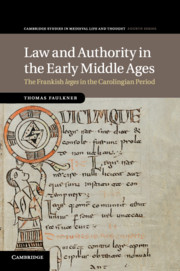Book contents
- Frontmatter
- Contents
- List of illustrations
- List of tables
- Abbreviations
- INTRODUCTION
- 1 THE MINOR leges PART I. PROBLEMS, BACKGROUND, Lex Ribuaria, Ewa ad Amorem
- 2 THE MINOR leges 2. SAXONY AND THE Lex Saxonum
- 3 THE ADDITIONAL CAPITULARIES
- 4 THE READING OF NORMATIVE TEXTS: BENEDICTUS LEVITA AND REGINO
- 5 THE MANUSCRIPTS OF THE leges-SCRIPTORIUM
- CONCLUSION
- Editions
- Bibliography
- General index
- Index of legal texts
- Index of manuscripts
1 - THE MINOR leges PART I. PROBLEMS, BACKGROUND, Lex Ribuaria, Ewa ad Amorem
Published online by Cambridge University Press: 05 February 2016
- Frontmatter
- Contents
- List of illustrations
- List of tables
- Abbreviations
- INTRODUCTION
- 1 THE MINOR leges PART I. PROBLEMS, BACKGROUND, Lex Ribuaria, Ewa ad Amorem
- 2 THE MINOR leges 2. SAXONY AND THE Lex Saxonum
- 3 THE ADDITIONAL CAPITULARIES
- 4 THE READING OF NORMATIVE TEXTS: BENEDICTUS LEVITA AND REGINO
- 5 THE MANUSCRIPTS OF THE leges-SCRIPTORIUM
- CONCLUSION
- Editions
- Bibliography
- General index
- Index of legal texts
- Index of manuscripts
Summary
INTRODUCTION
The starting point and central theme of the next two chapters is the relationship between ethnic identity and the leges. The view that the possession of leges gave a sense of civilisation to gentes can be found in classical and late antique histories available to the Carolingians. For Wormald, such a link was crucial also to understanding the leges in the early Middle Ages: the leges had a role in reinforcing feelings of ethnic identity, so ‘The lex of the Franks was more than Frankish law. It was the Frankish past. It was Frankish identity’. But ethnogenesis theorists have taught us to worry about what such statements might ever mean. We are constantly reminded that ethnic identity was malleable, and that we must be aware of the specific political context of each use of ethnic terminology. The production of each text encoded an argument, and each text might subsequently be used for different arguments in different contexts. As Pohl put it, texts ‘can only be understood properly if we do not see them as evidence for the natural existence of ethnic communities, but as part of strategies to give shape to these communities’. Ethnic identity must also always be ‘constituted through social contact’, so the nature of that social contact needs to be central to any investigation of the meaning of the terminology.
Although we now have sophisticated accounts of the meaning and purpose of ethnic terminology in some of the earliest leges barbarorum, they have been geared towards the period in which the leges were composed. In this period, the emergence of ethnic kingdoms and an ethnic discourse has been seen as a fundamental development in the transformation of the Roman world. The possible use Wormald suggested, that leges continued in the Carolingian period to be relevant to questions of ethnicity, has not been considered in detail. Indeed, ethnicity, and ethnic processes in general, have been studied in less detail in the Carolingian period than in the previous period.
In the studies we have, the use of Frankish terminology in both Merovingian and Carolingian periods has emerged as uniquely slippery.
- Type
- Chapter
- Information
- Law and Authority in the Early Middle AgesThe Frankish leges in the Carolingian Period, pp. 9 - 45Publisher: Cambridge University PressPrint publication year: 2016



